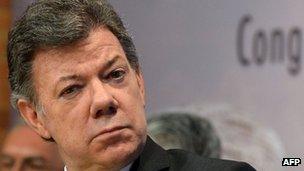Colombia peace talks: Government sets deadline for Farc
- Published

President Juan Manuel Santos reiterated that the rebels must disarm
Colombian President Juan Manuel Santos has set a deadline of November 2013 for an agreement to be reached in peace talks with the left-wing Farc rebels.
"This has to be a process of months, rather than years," he said.
Mr Santos said the government would offer all necessary guarantees so the Farc could abandon its weapons and join the political process.
He said any attempts to delay disarming were unacceptable. The Farc has not responded to Mr Santos' deadline.
'Prisoners of war'
The president's statement came as the rebel group acknowledged that it was holding what it called "prisoners of war", contradicting its previous denials.
Sandra Ramirez, one of the group's representatives at the peace talks currently taking place in Havana, told Cuba's Juventud Rebelde newspaper that they were holding soldiers or police captured during fighting.
She said they could be freed in return for the release of rebels held by the government.
Mrs Ramirez said the Colombian government had around 700 rebel prisoners. But she declined to say how many "prisoners of war" were held by the Farc.
The Colombian authorities have previously rejected any prisoner swaps.
In February, the rebels announced that they would stop all political abductions and kidnappings for ransom. But victims' groups say the kidnappings have continued and not all hostages have been released.
Last week, the Farc freed four Chinese hostages who had been held captive for 17 months. They are thought to have been the only foreign hostages held by the group.
'Good atmosphere'
On Thursday, the Colombian government and Farc rebels concluded the first stage of talks in Cuba aimed at ending five decades of conflict. The talks are due to resume on Wednesday.
The talks are now expected to resume on 5 December
Chief government negotiator Humberto de la Calle said the peace talks were advancing as expected.
Ivan Marquez, who leads the rebel delegation. said there had been a good atmosphere, but stressed that both sides should not hurry to reach a deal.
He said there should be no room for mistakes and no timetables should be set.
The negotiations focused initially on the issue of land reform in Colombia, as it was a major reason for the uprising that brought about the establishment of the Farc in the early 1960s.
Four other points will be discussed: the end of armed conflict; guarantees for the exercise of political opposition and citizen participation; drug trafficking and the rights of victims of the conflict.
All previous attempts to reach a deal have failed.
The government ended the last peace talks in 2002, accusing the rebels of trying to regroup in a demilitarised zone.
Hundreds of thousands of people have died since the conflict began in Colombia, with millions more displaced.
The Farc numbered 16,000 in 2001 but are now thought to have some 8,000 fighters.
- Published18 October 2012
- Published24 September 2015
- Published19 November 2012